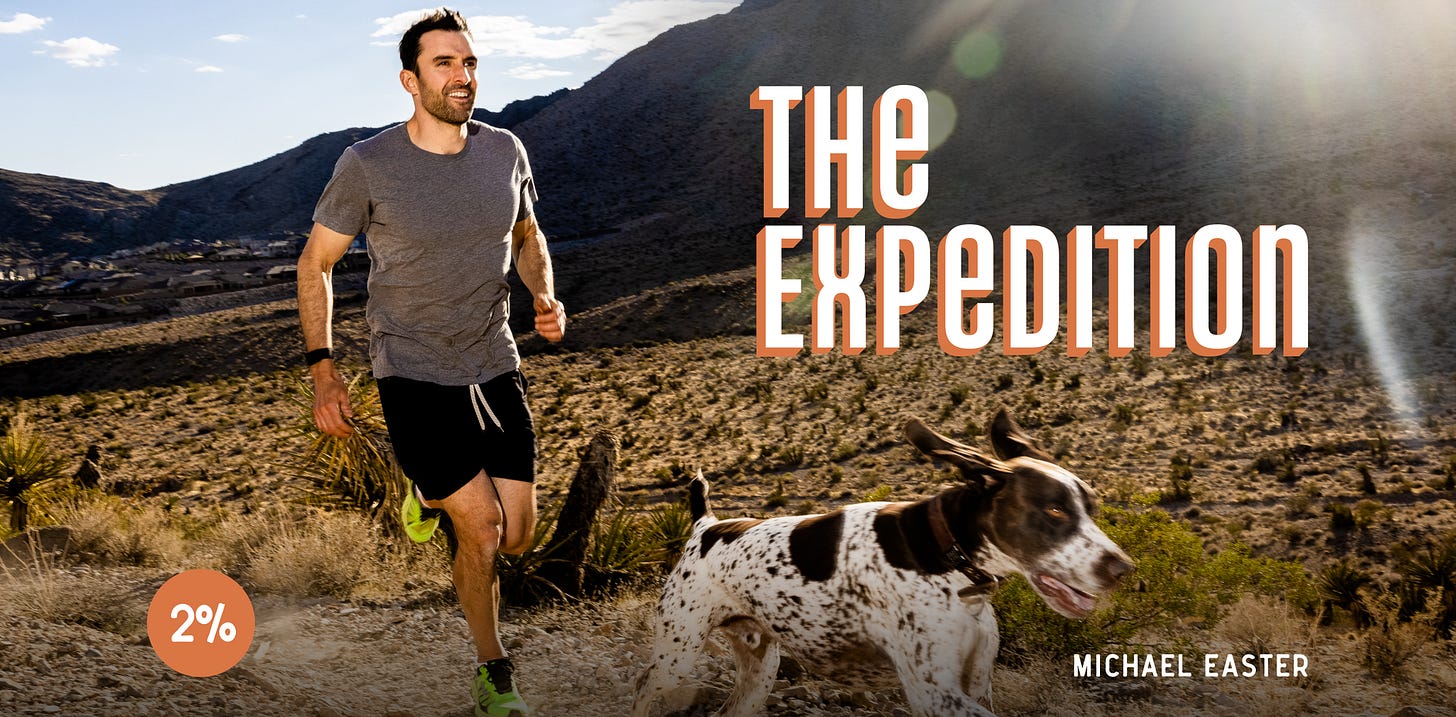The Expedition: May Edition
Ozempic stats, running, death, great podcasts and albums, etc.
Housekeeping
Full access to this post is for Members, who are people who like to have fun and not die.
Become a Member below to get full access to all 2% content and podcasts. We save you more time and money than the monthly fee.
🚨 E-book versions of Scarcity Brain and The Comfort Crisis are on super sale 🚨
Scarcity Brain is $1.99 until 5/19.
The Comfort Crisis will be $2.99 on Amazon on 5/19.
I like E-Books because it's easy to search for information and import your highlights into a document.
Thanks to our sponsors, who make the best products in their categories.
Momentous Nutrition: The company that made me feel good about supplements again. The US Military and most pro sports teams trust it.
GORUCK: Maker of the best rucking gear (not stuff).
Maui Nui Venison: Provider of the world’s healthiest meat (the research, linked here, is insane).
Discount code EASTER for all brands.
Podcast Preview (the full Member episode is below)
Today’s post: The Expedition
This monthly series is a journey into thoughts, opinions, ideas, observations, studies, facts, figures, etc. Good ones, bad ones, insightful ones, dumb ones, and ones you can use to live better.
It’s a roundup of all the worthwhile stuff I’ve encountered in the last month. It’s a bit of an island of misfit toys. But, hey, the greatest journeys are winding.
This month, we’re covering:
Numbers on:
Running and longevity.
The 4-Minute mile.
How the 4-Minute mile compares to mountaineering.
How much weight you'll lose on Ozempic in the long term (not short term).
The odds of one of the two main presidential candidates dying in the next year.
Life satisfaction.
How much crazier the internet is compared to real life.
The three factors that put you most at risk of dying young of heart disease.
The limitations of data, and what data misses.
What science says about staying hydrated this summer.
How humans compare to different animals in a foot race.
An incredible podcast episode.
A wise quote on death and how to view it.
Four albums that changed my worldview.
By The Numbers
4.7
Extra years beyond their predicted life expectancy people who ran a 4-minute lived.
Takeaway: "Sub-4 min mile runners have increased longevity compared with the general population, thereby challenging the notion that extreme endurance exercise may be detrimental to longevity," the researchers wrote.
732
Americans have run a sub-4-minute mile.
The number is closer to 2,000 if you include the entire world.
3:43.13
Is the fastest mile ever. This was accomplished by the Moroccan runner Hichan El Guerrouj in 1999. He was 24 years old.
6,664
People have summited Mt. Everest.
~700
People have summited K2, the world's second tallest mountain. The mountaineer George Bell called K2 "The Savage Mountain." It's a more dangerous climb, with one person dying for every four who reach the summit.
10
Is the percent of their body weight people who took Semaglutide/Ozempic lost after taking the drug for four years.
The participants lost the weight in the first year and remained stable thereafter. The drug, however, didn't work for everyone, and some gained weight.
12
Percent likelihood of one of the two main presidential candidates dying in the next year, based on Social Security Administration actuarial data.
18
Percent fewer Americans say they are very satisfied how their lives are going right now than in January 2020.
Sixty-five percent said they were very satisfied with their life in January 2020. Now the figure is 47. That's an 18 percent absolute drop and a 28 percent relative drop.
50
Percent crazier and worse everything you see online is compared to reality.
This is a guesstimate from the scholar Alan Levinovitz. But, hey, it tracks.
Three Ways to Die Young of Heart Disease
Smoke.
Have a high Lp(a), a type of lipoprotein.
Have a history of family members who got heart disease early.
Dr. Paddy Barrett wrote, "As a cardiologist, I've seen thousands of patients with heart disease. But the ones who get it at a young age generally have 1 of (those) 3 things going on."
Your move:
Don't smoke
Know your Lp(a)
Talk a cardiologist if you have an early family history of heart disease.
The Limits of Data
Thi Nguyen is one of my favorite philosophers.
You'll recognize his name if you read Scarcity Brain. He's the guy I spoke to about the downsides of gamification and quantification.
We make decisions based on big data every day. It affects the media you see, what you buy online, how you get from point A to B, and more. But it isn't perfect.
Nguyen released a new paper on the limits of data—and what gets systematically left out when big institutions collect and act on data. Mainly, nuance, context, and personal preference.
He recently published a Twitter thread breaking down some of the paper's ideas and highlights. Here's one snippet to set us up:
Data is powerful because it's easy to understand for different people from different backgrounds. That makes it easy to move between groups.
But in making data portable, you have to engineer out a lot of context and nuance—and that can leave out critical aspects of information, the experience of the material, and/or emphasize other aspects for specific groups.
For example, you get art based on what everyone else watches.
Read the full thread here and the full paper here.
Nguyen is working on a new book. We'll be keeping an eye out for that.
What science says about staying hydrated this summer
Keep reading with a 7-day free trial
Subscribe to Two Percent with Michael Easter to keep reading this post and get 7 days of free access to the full post archives.



